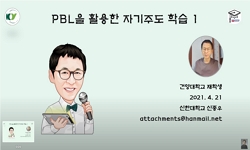In order to attain the best-educated people in a rapidly changing, modern society with English is an official language, this study applies the problem-based learning (PBL) method to the English Science Class. PBL problems were developed for PBL classe...
http://chineseinput.net/에서 pinyin(병음)방식으로 중국어를 변환할 수 있습니다.
변환된 중국어를 복사하여 사용하시면 됩니다.
- 中文 을 입력하시려면 zhongwen을 입력하시고 space를누르시면됩니다.
- 北京 을 입력하시려면 beijing을 입력하시고 space를 누르시면 됩니다.
부가정보
다국어 초록 (Multilingual Abstract)
In order to attain the best-educated people in a rapidly changing, modern society with English is an official language, this study applies the problem-based learning (PBL) method to the English Science Class. PBL problems were developed for PBL classes, and their effectiveness has been proven. The focus of this study was five PBL questions posed during the first semester, targeting seven learners in the fourth grade of Elementary School A. The questions were divided into levels aimed at each grade, with the emphasis on specialized English education. Learners wrote journals, peer evaluations, and self-evaluations after finishing their PBL classes. Also, a survey about PBL was conducted after the first semester. The results of the study showed that learners experienced an 86% improvement in presentation skills, an 86% improved interest in learning, 86% better understanding, and 100% improvement in both problem-solving skills and cooperation. On the other hand, learners had difficulty in understanding PBL problems, and with research using the internet. PBL was somewhat unfamiliar to the students, but the survey found that learners are already aware of its effectiveness, and that they are interested in PBL.
참고문헌 (Reference)
1 I. A. Kang, "Why constructivism? Learner-centered educational environment in information-oriented age" Muneumsa 1998
2 Y. S. Cho, "Theory and Practice of Problem-Based Learning" Hakjisa 3-6, 2006
3 Y. S. Kim, "The Development of the Component Standard and the Learning for English Subject PBL" Catholic Kwandong University 2017
4 D. N. Syarafina, "The Application of Problem Based Learning to Improve Students'Self-efficacy" 2018
5 S. M. Loyens, "Self-Directed Learning in Problem-Based Learning and its Relationships with Self-Regulated Learning" 20 : 411-427, 2008
6 H. S. Barrows, "Problem-based learning in secondary schools"
7 J. R. Savery, "Constructivist Learning Environments" Educational Technology Publications 135-150, 1996
8 N. Aldoobie, "ADDIE Model" 5 (5): 68-72, 2015
9 S. K. Park, "A Study on the Application of Creative Drama for the Application of Problem-Based Learning(PBL)Theory-Focusing on 'Integrated Curriculum' in Low-grade Elementary School-" Graduate School of Sejong University 2019
10 H. J. Yoon, "(The)development and implementation of Problem-Based Learning strategy and the examination of its pedagogical effectiveness" The Graduate School Ewha Womans University 2009
1 I. A. Kang, "Why constructivism? Learner-centered educational environment in information-oriented age" Muneumsa 1998
2 Y. S. Cho, "Theory and Practice of Problem-Based Learning" Hakjisa 3-6, 2006
3 Y. S. Kim, "The Development of the Component Standard and the Learning for English Subject PBL" Catholic Kwandong University 2017
4 D. N. Syarafina, "The Application of Problem Based Learning to Improve Students'Self-efficacy" 2018
5 S. M. Loyens, "Self-Directed Learning in Problem-Based Learning and its Relationships with Self-Regulated Learning" 20 : 411-427, 2008
6 H. S. Barrows, "Problem-based learning in secondary schools"
7 J. R. Savery, "Constructivist Learning Environments" Educational Technology Publications 135-150, 1996
8 N. Aldoobie, "ADDIE Model" 5 (5): 68-72, 2015
9 S. K. Park, "A Study on the Application of Creative Drama for the Application of Problem-Based Learning(PBL)Theory-Focusing on 'Integrated Curriculum' in Low-grade Elementary School-" Graduate School of Sejong University 2019
10 H. J. Yoon, "(The)development and implementation of Problem-Based Learning strategy and the examination of its pedagogical effectiveness" The Graduate School Ewha Womans University 2009
동일학술지(권/호) 다른 논문
-
- 한국산학기술학회
- 김한준
- 2020
- KCI등재
-
항공안전 향상을 위한 생체인식 기반 항공보안시스템 도입 및 국제표준화 활성화 연구
- 한국산학기술학회
- 조성환(Sung-Hwan Cho)
- 2020
- KCI등재
-
반복충격에 의한 한국형 소총의 공이 피로파괴 사례 연구
- 한국산학기술학회
- 이호준(Ho-Jun Lee)
- 2020
- KCI등재
-
F. L. Wright 작품들의 디자인 발전과정과 특성에 관한 연구
- 한국산학기술학회
- 황용운(Yong-Woon Hwang)
- 2020
- KCI등재
분석정보
인용정보 인용지수 설명보기
학술지 이력
| 연월일 | 이력구분 | 이력상세 | 등재구분 |
|---|---|---|---|
| 2026 | 평가예정 | 재인증평가 신청대상 (재인증) | |
| 2020-01-01 | 평가 | 등재학술지 유지 (재인증) |  |
| 2017-07-01 | 평가 | 등재후보로 하락(현장점검) (기타) |  |
| 2017-07-01 | 평가 | 등재학술지 선정 (계속평가) |  |
| 2015-01-01 | 평가 | 등재학술지 유지 (등재유지) |  |
| 2011-01-01 | 평가 | 등재학술지 유지 (등재유지) |  |
| 2008-01-01 | 평가 | 등재학술지 선정 (등재후보2차) |  |
| 2007-08-28 | 학술지등록 | 한글명 : 한국산학기술학회논문지외국어명 : Journal of Korea Academia-Industrial cooperation Society |  |
| 2007-07-06 | 학회명변경 | 영문명 : The Korean Academic Inderstrial Society -> The Korea Academia-Industrial cooperation Society |  |
| 2007-01-01 | 평가 | 등재후보 1차 PASS (등재후보1차) |  |
| 2005-01-01 | 평가 | 등재후보학술지 선정 (신규평가) |  |
학술지 인용정보
| 기준연도 | WOS-KCI 통합IF(2년) | KCIF(2년) | KCIF(3년) |
|---|---|---|---|
| 2016 | 0.68 | 0.68 | 0.68 |
| KCIF(4년) | KCIF(5년) | 중심성지수(3년) | 즉시성지수 |
| 0.66 | 0.61 | 0.842 | 0.23 |





 ScienceON
ScienceON







